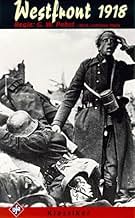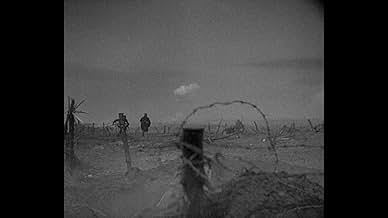VALUTAZIONE IMDb
7,3/10
2643
LA TUA VALUTAZIONE
Aggiungi una trama nella tua linguaA group of German solders fight on the front line in France at the end of World War I.A group of German solders fight on the front line in France at the end of World War I.A group of German solders fight on the front line in France at the end of World War I.
- Regia
- Sceneggiatura
- Star
- Premi
- 1 vittoria in totale
Hans-Joachim Möbis
- Der Student
- (as H.J. Moebis)
Aribert Mog
- Undetermined Secdondary Role
- (non citato nei titoli originali)
Gustav Püttjer
- Hamburger
- (non citato nei titoli originali)
André Saint-Germain
- Undetermined Secondary Role
- (non citato nei titoli originali)
Vladimir Sokoloff
- Meal Orderly
- (non citato nei titoli originali)
Ilse Trautschold
- Undetermined Secondary Role
- (non citato nei titoli originali)
Emil Wabschke
- Undetermined Secondary Role
- (non citato nei titoli originali)
Recensioni in evidenza
Invariably any piece of art banned by the Nazis as degenerate or in this case "cowardly defeatism" has something to offer. G.W Pabst crafts a powerful antiwar film by simply showing so many of its truisms - the senseless, horrific death of course, but also many other subversive elements, e.g. the possibility of friendly fire, the idiotic decisions made by leaders who are out of harm's way being served posh courses of food, one's wife or girlfriend being unfaithful, and the psychological trauma. At his best he simply leaves the camera stationary in longshot while men scurry about and kill one another for no good reason, letting the viewer draw their own conclusion about the madness they're witnessing.
I have to say though, the impact of it all was a little lessened because the images and concepts weren't as novel for me 90 years later, as unfair to the film as that might be. It lags as well when it's off the battlefield, showing among other things an uninteresting (and long) performance at a canteen, and the confrontation with the wife in bed with another man. I think it was trying to balance out the warfare and build up characters so that we were invested in them, but I struggled to stay interested (this and the bleakness of the thing make it one I wouldn't reach for again). Kudos to Pabst for making it, and I loved the way he closes it with "The End?!", certainly well aware of growing militarism and possibility for another devastating war.
I have to say though, the impact of it all was a little lessened because the images and concepts weren't as novel for me 90 years later, as unfair to the film as that might be. It lags as well when it's off the battlefield, showing among other things an uninteresting (and long) performance at a canteen, and the confrontation with the wife in bed with another man. I think it was trying to balance out the warfare and build up characters so that we were invested in them, but I struggled to stay interested (this and the bleakness of the thing make it one I wouldn't reach for again). Kudos to Pabst for making it, and I loved the way he closes it with "The End?!", certainly well aware of growing militarism and possibility for another devastating war.
The very interesting director, GW Pabst directs a war movie in his first movie with sound, and he uses it to amazing effect. There hardly is a story, just the usual Some Nice Kids Go To War And Find Out That, Gee! War Is Hell! Hokum. The movie is nothing but a sensory experience. The war scenes in this movie are very frighteningly realistic. TO be honest, I have NO idea how he achieved some of the explosion shots. They looked like they were exploding very close to the actors in some scenes. I guess they didn't have actor's unions in those days. LOL..
Film can overextend its welcome, but it depends on what you're looking for, I guess.
Film can overextend its welcome, but it depends on what you're looking for, I guess.
Although this covers the same broad subject matter as "All Quiet", there is a different and welcome perspective and the film making is very definitely more European in style, harder edged and more matter of fact, which I have to say I prefer. For the English speaking audience it does suffer in that it has not been cared for and restored in the same way as "All Quiet". The version I saw had some rather jarring (at least to my English ears) subtitles, which showed that the UK and the USA are indeed two countries divided by a common language. I'm not sure what German words translate as "What in tarnation". Having said that the film was powerful, innovative and quite startling in its use of sound, which we should bear in mind had only been in use for 3 years or so. If someone knows where there is a restored version for the English speaking audience (preferably on DVD) I will be first in the queue
This is a movie that actually doesn't really have a main plot-line in terms of following one main character and have a clear beginning, middle part and end. Just like war there is no logic in it and things just happen within this movie as the movie moves along. It puts you right in the middle of things and shows you the madness of war.
It handles all different kinds of aspects from the war. It doesn't only show the situation from the viewpoint of the young soldiers but it also focuses on the family and girls back home. It doesn't do this by featuring it too prominently but picks out an handful of minor characters and just a couple of sequences to get the message across. This works out really well and it doesn't feel melodramatic or anything like that. Modern movies can really learn something from this.
But of course foremost the movie gets set in the trenches, somewhere in France. The movie is filled with some WW I battle sequences, which are all surprising good and authentic looking. Guess lots of materials and places from WW I were still around during the production of this movie so they did not have an hard time recreating the look and feeling of the battles fought out in the trenches.
It was the first sound movie from Georg Wilhelm Pabst and this shows. Nothing too major, it are just some little things showing you that 'talkies' hadn't been around yet for very long and Georg Wilhelm Pabst wasn't also too experienced with it yet. He pretty much shot this movie in the same way as he would had filmed a silent movie.
The movie is of course also original with the fact that it tells the story from the German point of view. While watching this movie you don't actually ever give you the feeling you're watching the movie from the 'evil' and bad point of view. All parties are more or less victims within a war and things are not as black & white as they always seem.
Simply a real good and effective WW I production, especially when considering that it got shot way back in 1930.
8/10
http://bobafett1138.blogspot.com/
It handles all different kinds of aspects from the war. It doesn't only show the situation from the viewpoint of the young soldiers but it also focuses on the family and girls back home. It doesn't do this by featuring it too prominently but picks out an handful of minor characters and just a couple of sequences to get the message across. This works out really well and it doesn't feel melodramatic or anything like that. Modern movies can really learn something from this.
But of course foremost the movie gets set in the trenches, somewhere in France. The movie is filled with some WW I battle sequences, which are all surprising good and authentic looking. Guess lots of materials and places from WW I were still around during the production of this movie so they did not have an hard time recreating the look and feeling of the battles fought out in the trenches.
It was the first sound movie from Georg Wilhelm Pabst and this shows. Nothing too major, it are just some little things showing you that 'talkies' hadn't been around yet for very long and Georg Wilhelm Pabst wasn't also too experienced with it yet. He pretty much shot this movie in the same way as he would had filmed a silent movie.
The movie is of course also original with the fact that it tells the story from the German point of view. While watching this movie you don't actually ever give you the feeling you're watching the movie from the 'evil' and bad point of view. All parties are more or less victims within a war and things are not as black & white as they always seem.
Simply a real good and effective WW I production, especially when considering that it got shot way back in 1930.
8/10
http://bobafett1138.blogspot.com/
Very much worth viewing. I caught it on Turner Classic Movies recently, and was very pleasantly surprised by the quality of this film.
This film transcends the limitations of the sensibilities of the time and the special effects available to movie makers. It makes no sweeping statements or judgments about war and aggression. It simply gives you a glimpse of what it was like to live and die in the trenches of The Great War.
Although not as intense as "All Quiet on the Western Front" (whose subject matter it shares), it has its moments of artistry. It is also more narrowly focused than "All Quiet..", but its story is compelling and riveting. Should be in anybody's serious list of worthy war movies.
This film transcends the limitations of the sensibilities of the time and the special effects available to movie makers. It makes no sweeping statements or judgments about war and aggression. It simply gives you a glimpse of what it was like to live and die in the trenches of The Great War.
Although not as intense as "All Quiet on the Western Front" (whose subject matter it shares), it has its moments of artistry. It is also more narrowly focused than "All Quiet..", but its story is compelling and riveting. Should be in anybody's serious list of worthy war movies.
Lo sapevi?
- QuizThis film was banned by the Nazis after they came into power in Germany in 1933.
- BlooperThe depth of the trenches is inaccurate. In several scenes where the soldiers are standing up, their heads are higher than the top of the trench, making them easy targets for snipers and also allowing the French to monitor troop movements.
- Citazioni
Woman in rationed food line: What are you doing? Back of the line!
Another Woman in rationed food line: What's wrong with the old cow? Cutting in line!
Man in rationed food line: Leave the woman alone.
Woman cutting in rationed food line: My Adolf is dead.
Woman in rationed food line: Think you're the only one? That's no reason to cut in line. Go to the back!
- ConnessioniEdited into A Hellish Chaos (2017)
I più visti
Accedi per valutare e creare un elenco di titoli salvati per ottenere consigli personalizzati
- How long is Westfront 1918?Powered by Alexa
Dettagli
- Data di uscita
- Paese di origine
- Lingue
- Celebre anche come
- Westfront 1918
- Luoghi delle riprese
- Aziende produttrici
- Vedi altri crediti dell’azienda su IMDbPro
- Tempo di esecuzione1 ora 15 minuti
- Colore
- Proporzioni
- 1.20 : 1
Contribuisci a questa pagina
Suggerisci una modifica o aggiungi i contenuti mancanti



























